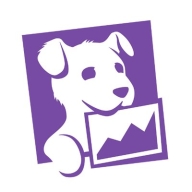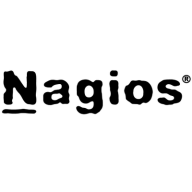

Datadog and Nagios Core are prominent competitors in the IT monitoring software category. Datadog appears to have an advantage due to its extensive feature set and integration capabilities.
Features: Datadog offers a customizable alert system, graphical dashboard creation, and comprehensive data visualization tools. It also provides strong integration with various platforms and services. Nagios Core is valued for its core monitoring capabilities and the flexibility provided by its open-source nature, which allows extensive customization without resource-heavy demands.
Room for Improvement: Datadog users mention high costs associated with its pricing model and a steep learning curve as areas needing improvement. A need for straightforward queries and better documentation is also noted. Nagios Core could improve in user-friendliness and integration with modern technologies, as its dependency on command-line setup is challenging for inexperienced users.
Ease of Deployment and Customer Service: Datadog is praised for robust customer support during deployment and configuration, particularly in cloud environments. Meanwhile, Nagios Core requires deeper system administration skills for deployment and lacks customer support due to its open-source nature, with a strength in on-premises environments.
Pricing and ROI: Datadog's cost is linked to its extensive features and data consumption, making it expensive without proper management. It suits organizations needing comprehensive commercial support. In contrast, Nagios Core is attractive for budget-conscious teams due to zero initial licensing costs, though setup and maintenance require significant time and expertise investment. Datadog is preferred for those prioritizing comprehensive features and support, while Nagios Core is ideal for cost-efficiency and specific customizations.
Previously we had thirteen contractors doing the monitoring for us, which is now reduced to only five.
Datadog has delivered more than its value through reduced downtime, faster recovery, and infrastructure optimization.
I believe features that would provide a lot of time savings, just enabling you to really narrow down and filter the type of frustration or user interaction that you're looking for.
When I have additional questions, the ticket is updated with actual recommendations or suggestions pointing me in the correct direction.
Overall, the entire Datadog comprehensive experience of support, onboarding, getting everything in there, and having a good line of feedback has been exceptional.
I've had a couple instances where I reached out to Datadog's support team, and they have been really super helpful and very kind, even reaching back out after resolving my issues to check if everything's going well.
Datadog's scalability has been great as it has been able to grow with our needs.
We did, as a trial, engage the AWS integration, and immediately it found all of our AWS resources and presented them to us.
Datadog's scalability is strong; we've continued to significantly grow our software, and there are processes in place to ensure that as new servers, realms, and environments are introduced, we're able to include them all in Datadog without noticing any performance issues.
The solution is scalable.
Datadog is very stable, as there hasn't been any downtime or issues since I've been here, and it's always on time.
Datadog seems stable in my experience without any downtime or reliability issues.
Datadog seems to be more stable, and I really want to have a complete demo before making a call to decide on this.
I tried many other solutions at work, however, in terms of Nagios, I haven't seen any disruption or downtime.
It would be great to see stronger AI-driven anomaly detection and predictive analytics to help identify potential issues before they impact performance.
We want to be able to customize the cost part, and we would appreciate more granular access control.
The documentation is adequate, but team members coming into a project could benefit from more guided, interactive tutorials, ideally leveraging real-world data.
The setup cost for Datadog is more than $100.
Everybody wants the agent installed, but we only have so many dollars to spread across, so it's been difficult for me to prioritize who will benefit from Datadog at this time.
My experience with pricing, setup cost, and licensing is that it is really expensive.
Our architecture is written in several languages, and one area where Datadog particularly shines is in providing first-class support for a multitude of programming languages.
Having all that associated analytics helps me in troubleshooting by not having to bounce around to other tools, which saves me a lot of time.
Datadog was able to find the alerts and trigger to notify our team in a very prompt manner before it got worse, allowing us to promptly adjust and remediate the situation in time.
You can monitor anything.
| Product | Market Share (%) |
|---|---|
| Datadog | 2.5% |
| Nagios Core | 1.9% |
| Other | 95.6% |

| Company Size | Count |
|---|---|
| Small Business | 80 |
| Midsize Enterprise | 46 |
| Large Enterprise | 99 |
| Company Size | Count |
|---|---|
| Small Business | 20 |
| Midsize Enterprise | 11 |
| Large Enterprise | 22 |
Datadog integrates extensive monitoring solutions with features like customizable dashboards and real-time alerting, supporting efficient system management. Its seamless integration capabilities with tools like AWS and Slack make it a critical part of cloud infrastructure monitoring.
Datadog offers centralized logging and monitoring, making troubleshooting fast and efficient. It facilitates performance tracking in cloud environments such as AWS and Azure, utilizing tools like EC2 and APM for service management. Custom metrics and alerts improve the ability to respond to issues swiftly, while real-time tools enhance system responsiveness. However, users express the need for improved query performance, a more intuitive UI, and increased integration capabilities. Concerns about the pricing model's complexity have led to calls for greater transparency and control, and additional advanced customization options are sought. Datadog's implementation requires attention to these aspects, with enhanced documentation and onboarding recommended to reduce the learning curve.
What are Datadog's Key Features?In industries like finance and technology, Datadog is implemented for its monitoring capabilities across cloud architectures. Its ability to aggregate logs and provide a unified view enhances reliability in environments demanding high performance. By leveraging real-time insights and integration with platforms like AWS and Azure, organizations in these sectors efficiently manage their cloud infrastructures, ensuring optimal performance and proactive issue resolution.
This is IT infrastructure monitoring's industry-standard, open-source core. Free without professional support services.
We monitor all Network Monitoring Software reviews to prevent fraudulent reviews and keep review quality high. We do not post reviews by company employees or direct competitors. We validate each review for authenticity via cross-reference with LinkedIn, and personal follow-up with the reviewer when necessary.